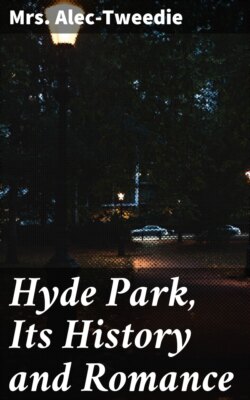Читать книгу Hyde Park, Its History and Romance - Mrs. Alec-Tweedie - Страница 8
Оглавление“Women, who were our first apostles,
Without whose aid w’ had all been lost else;
Women, that left no stone unturned
In which the Cause might be concern’d:
Brought in their children’s spoons and whistles,
To purchase swords, carbines, and pistols;
Their husbands, cullies, and sweethearts,
To take the saints’ and church’s parts;
Drew several gifted brethren in,
That for the Bishops would have been,
And fixed them constant to the Party,
With motives powerful and hearty:
Their husbands robb’d, and made hard shifts,
T’ administer unto their gifts
All they could rap, and rend, and pilfer,
To scraps and ends of gold and silver;
What have they done, or what left undone,
That might advance the Cause at London?
March’d rank and file, with drum and ensign,
T’ entrench the city for defence in;
Rais’d rampires with their own soft hands,
To put the enemy to stands;
From ladies down to oyster-wenches
Labour’d like pioneers in trenches,
Fell to their pick-axes and tools,
And help’d the men to dig like moles?”
The women, and even ladies of rank and fortune, not only encouraged the men, but worked with their own hands. Dr. Nash mentions Lady Middlesex, Lady Foster, Lady Anne Walker, and Mrs. Dunch as having been particularly celebrated for their activity.
Again in the Perfect Diurnal of 4th January 1643, one reads:
“Collonell Browne the Scotchman, upon some Complaints made against him by his Souldiers, for detaining their pay, was apprehended this day by the Court of Guard at Hide Park, by an order from the Close Committee, and Committed to safe custody to answere the same.”
So we may conclude that all was not peace among the troops encamped in the Park.
In the State Papers there are several references to Hyde Park, throwing sidelights on the life of the people of the day. For instance, after the Battle of Naseby every person of consequence who had been engaged in the struggle was strictly supervised, and it was necessary for all strangers to have a pass to enter the City of London.
The Earl of Northampton, wishing to cross to Holland, secured a pass to embark from London, and arriving at the fortress at Hyde Park Corner, then so called, but now the Marble Arch, duly handed it to the Captain commanding the Guard. That officer, finding the Earl was accompanied by five servants while his pass only allowed four, seized one of the horses. The Earl, detained much to his annoyance by this incident, petitioned the Committee of both Kingdoms to restore the animal. The Committee, although commending the Captain for close observance of duty, explained that as the Earl of Northampton was going beyond the seas he would need the horse, and therefore they wished it returned.
This examination at Hyde Park must have been very searching, for in the Perfect Diurnal of 5th January 1643, it is recorded that
“Sir Edward Wardner, Doctor Castle of Westminster, Doctor Fuller of the Savoy, Mr. Dinckson of Saint Clements, and some others this day set forward towards Oxford with a Petition to His Majesty for an accommodation (as is pretended); and being examined upon the way by the Courts of Guard at Hide Parke, they produced a Warrant from the Lords in Parliament for the free Passage with their Petition to His Majesty without interception. Whereupon the Captaine of the Guard told them that though he was commanded by their Warrant to give them free Passage with their Petition, yet he would search them, that they should carry nothing else to his Majesty, which he did accordingly, and found divers Letters about them, especially Doctor Dinckson.”
These papers were handed to the Commons, and the Committee found them to be “of a very high and dangerous consequence.” The party, after having been stripped of all papers except their petition, had been allowed to proceed to Oxford, but a troop of “Dragouners” was sent to bring them back to Parliament, so back they came, done.
